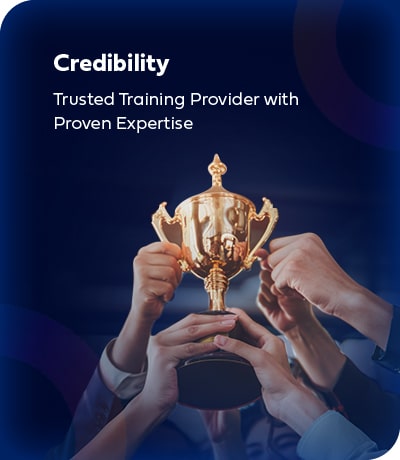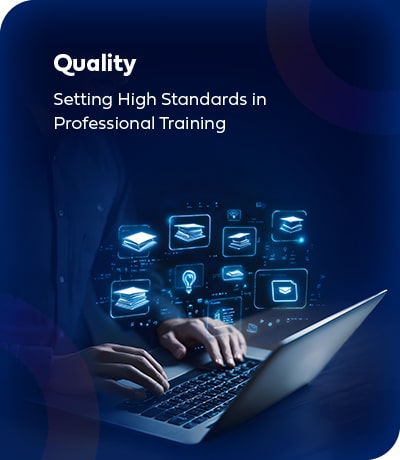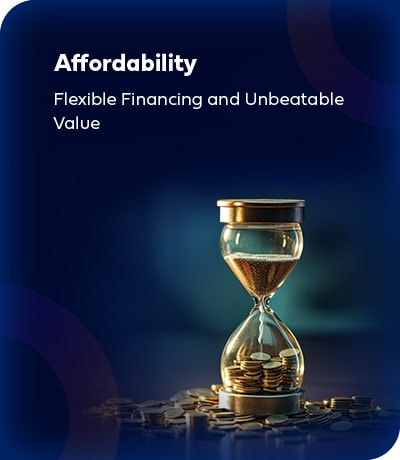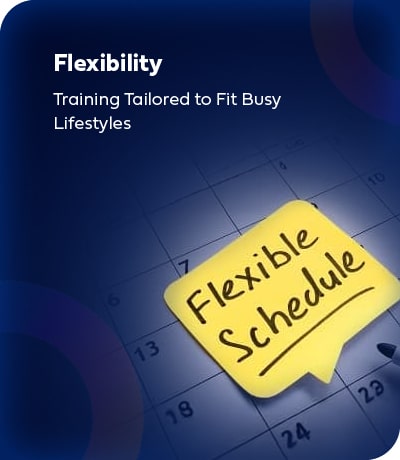
Heat up your career with our 

Online Course
Start learning immediately
1,023 Students enrolled
Price Match
Guarantee

3 months instalments of: £898.33
6 months instalments of: £449.17
9 months instalments of: £299.44
12 months instalments of: £224.58

By submitting this form, you agree to e-Careers processing your data in line with our Privacy Policy
Take your first steps towards becoming a Chartered Global Management Accountant with CIMA with our CIMA Professional Qualification package. This package includes the training courses for all three CIMA Professional levels: Operational, Management, and Strategic. All three levels are accredited qualifications regulated by the leading institute for Management Accountants worldwide, The Chartered Institute of Management Accountants.
This CIMA training package has been developed for those with relevant experience or qualifications or looking to start earning their CGMA status.
The CIMA Professional package trains you with core management accounting knowledge and supports you step-by-step on your CGMA journey. Completing this course will demonstrate to employers that you have the expertise to provide financial leadership and drive performance improvements, ultimately increasing your professional recognition.
Completing your Operational, Management, and Strategic qualification levels will earn you the designatory letters CIMA Dip MA, CIMA Adv Dip MA, and ACMA, respectively, as you progress to each level. You'll also be awarded the CGMA designation after completing at least three years of verified relevant work-based practical experience.
CIMA Professional Qualification positions you in finance, management, and accounting roles such as Management Accountant, Financial Accountant, Management Consultant, Finance Controller, Chief Finance Officer, and many more.
Our CIMA Professional Qualification complete course package offers you the following:
Access to industry-leading eLearning platform.
CIMA-approved training course materials.
Support from award-winning, industry-expert Tutors.
A collection of digital resources.
Kaplan physical study books.
Interactive course content.
Interest-free payment options.
Best price guaranteed on like-for-like courses.
Support from an organisation that has trained over 630,000 students.
CIMA Professional is a structured programme to help you advance towards strategic financial leadership. The qualification consists of three levels: Operational, Management, and Strategic. Each level advances in complexity and strategic focus, and all three align with the qualification's pillars: Enterprise, Performance, and Financials, ensuring a well-rounded development of your financial expertise.
Our course provides comprehensive support to help you master these three levels and pass all your exams.
CIMA Professional - Operational Level
The CIMA Operational Level is the starting level of the CGMA Professional Qualification. This level equips you with knowledge, tools, and techniques to support short-term decision-making at the operational level of the organisation.
You'll also learn how to leverage technology in managing finance, the various costing methods, and the regulatory environment of financial reporting.
Managing Finance in a Digital World (E1)
The expected learning outcomes for this subject are the following:
Learn the central role that finance plays in an organisation and how and why technologies are used to impact the finance function.
Learn how to use and examine data collected and processed by machines to create and preserve value for organisations.
Find out how the finance function is structured and shaped and how it interacts with other parts of the organisation to achieve the objectives of the whole organisation.
For this subject, the key concepts that you'll learn are:
Role of the finance function.
Technology in a digital world.
Data and information in a digital world.
Shape and structure of the finance function.
Finance interacting with the organisation.
Management Accounting (P1)
The expected learning outcomes for this subject are the following:
Find out why and what costing is used for, including appropriate costing methods and techniques and where digital costing might be used.
Learn how budgets are prepared and implemented across the organisation and the impact these have.
Using appropriate risk management tools, learn how techniques are applied to ensure sound short-term decision-making against risk and uncertainty.
For this subject, the key concepts that you'll learn are:
Cost Accounting for decision and control.
Budgeting and budgetary control.
Short-term commercial decision-making.
Risk and uncertainty in the short term.
Financial Reporting (F1)
The expected learning outcomes for this subject are the following:
Identify the regulators, what they do, why, and how regulations are applied.
Learn how to prepare basic financial statements using financial reporting standards.
Find out how to distinguish between types of taxes, calculate corporation taxes and issues affecting taxation.
Discover what tools are used to ensure the organisation has enough cash for ongoing operations.
For this subject, the key concepts that you'll learn are:
The regulatory environment of financial reporting.
Financial statements.
Principles of taxation.
Managing cash and working capital.
CIMA Professional - Management Level
The CIMA Management Level is the intermediate level of the CGMA Qualification. This level equips you with the knowledge, tools, and techniques to make informed decisions at the mid-management level of the organisation.
You'll also learn how to measure performance, create value, implement business models, and apply advanced reporting standards by the Integrated Reporting Framework.
Managing Performance (E2)
The expected learning outcomes for this subject include:
Learn the fundamentals of business models and how new business and operating models can be developed to improve the performance of organisations.
Discover how different leadership styles can be used to improve the performance of individuals to achieve organisational goals.
Master how to use performance management concepts and techniques to implement strategies effectively and efficiently.
Master the use of project management concepts and techniques useful in implementing strategies. (Project management is linked to capital investment decision-making, which is covered in P2D).
For this subject, the key concepts that you'll learn are:
Business models and value creation.
Managing people performance.
Managing projects.
Advanced Management Accounting (P2)
The expected learning outcomes for this subject are the following:
How to use cost management, quality and process management, and value management to provide organisations with cost advantage.
Discover the criteria, processes, and techniques to decide which projects to undertake.
Learn how to manage the performance of organisational units to ensure that they achieve their objectives.
Learn how to analyse risks and uncertainties that organisations face in the medium term, especially in capital investment decision-making, and manage those risks in implementing such decisions.
For this subject, the key concepts that you'll learn are:
Managing the costs of creating value.
Capital investment decision-making.
Managing and controlling the performance of organisational units.
Risk and control.
Advanced Financial Reporting (F2)
The expected learning outcomes for this subject are the following:
Identify the sources and types of funds and how much they cost.
Master the key financial reporting standards on which financial statements will be based and apply those standards to prepare group accounts.
Learn more about the International Integrated Reporting Framework and its components, as well as how to conduct financial statement analyses and their limitations.
For this subject, the key concepts that you'll learn are:
Financing capital projects.
Financial reporting standards.
Group accounts.
Integrated reporting.
Analysing financial statements.
CIMA Professional - Strategic Level
The CIMA Strategic Level is the advanced and final level of the CGMA Professional Qualification. It focuses on long-term strategy formulation and decision-making concepts, tools, and frameworks.
You'll also learn how to formulate and implement strategies, manage risks, and use various techniques in business valuation.
Strategic Management (E3)
The expected learning outcomes for this subject are the following:
Gain an understanding of the foundation of strategic management, the dynamics of the organisational ecosystem and how it affects an organisation's strategy.
Strategic choice and how options are generated, linking them to the organisation's purpose, values and vision and how the options are evaluated, chosen, and integrated coherently to form the organisation's strategy.
Discover how strategy is implemented, implementation objectives are achieved, and change is managed.
Identify the technologies that underpin digital transformation and various elements of digital strategy.
For this subject, the key concepts that you'll learn are:
The Strategy Process.
Analysing the organisational ecosystem.
Generating strategic options.
Making strategic choices.
Strategic control.
Digital strategy.
Risk Management (P3)
The expected learning outcomes for this subject are the following:
Identify, evaluate, and manage enterprise risks.
Learn where strategic risks emanate from, how to evaluate them, and how oversight of these risks is critical to the organisation's governance.
Understand how internal controls can be used effectively in the risk management process.
Discover how to identify, analyse, remedy and report strategic and cyber risks.
For this subject, the key concepts that you'll learn are:
Enterprise risk.
Strategic risk.
Internal controls.
Cyber risk.
Financial Strategy (F3)
The expected learning outcomes for this subject are the following:
Discover the different strategic financial objectives and policy options open to organisations.
Find out the types of funds available to organisations to finance the implementation of their strategies, including where and how they access these funds at the right time, in the right quantities and at the right cost.
Discover the sources of financial risk, how to evaluate and manage financial risks appropriately, and techniques in business valuation to assess whether a company has created and preserved value within the organisation.
Master the valuation techniques to calculate the value of organisations and conditions applicable for such calculations, especially intangibles in the digital world,
Learn how to report intangible value and their drivers in integrated reporting.
For this subject, the key concepts that you'll learn are:
Financial policy decisions.
Sources of long-term funds.
Financial risks.
Business valuation.
Format
As the CIMA Professional comprises three CIMA courses, each with three exams and one case study, you will be required to sit nine objective tests and three case study exams. Each CIMA level requires passing three objective tests and a case study exam before earning the qualification.
The objective tests are multiple-choice and computer-based and assess all component learning outcomes you have covered at each level. Meanwhile, the case study exam is also a computer-based format that covers all the knowledge, skills, and techniques across each level and assesses how you apply them to real-world situations.
Duration
For the Operational Level, here is the test duration for each exam:
Managing Finance in a Digital World (E1): 90 minutes.
Management Accounting (P1): 90 minutes.
Finance Reporting (F1): 90 minutes.
Case Study Synoptic Exam: 3 hours.
Below are the duration for each exam at the Management Level:
Managing Performance (E2): 90 minutes.
Advanced Management Accounting (P2): 90 minutes.
Advanced Financial Reporting (F2): 90 minutes.
Case Study Synoptic Exam: 3 hours.
Here is the test duration for the exams at Strategic Level:
Strategic Management (E3): 90 minutes.
Risk Management (P3): 90 minutes.
Financial Strategy (F3): 90 minutes.
Case Study Synoptic Exam: 3 hours.
Availability
All exams from this level are available via the awarding body and can be taken at 5,500 Pearson VUE centres across 178 countries worldwide. You can take the objective exams on demand, while the case study is only available in four windows throughout the year. We'll provide you with all the support and resources you need to achieve exam success.
You'll need an active student subscription to sit your exams. Annual student subscriptions and exam fees are separate from the course price.
Objective tests are computer-marked, so you'll receive your provisional results within 48 hours. Case study, on the other hand, is human-marked, so it'll take 6 to 8 weeks before you can receive the results from this exam.
Our CIMA Professional training package is a complete course for finance professionals specialising in management accounting. If you have relevant experience or qualifications in finance and want to complete all levels of CGMA qualification from start to finish, this course package is for you!
To study the CIMA Professional package, we recommend that you:
Have achieved the CIMA Certificate in Business Accounting, AAT Level 4 Accounting, or equivalent qualification from an accredited awarding body.
Have an interest in undertaking and completing your CIMA's CGMA Professional Qualification.
Have a solid understanding of the English language.
Are comfortable with basic mathematics.
Have access to a PC or laptop (This course is compatible with both Mac and Windows).
While this qualification is delivered online, we also include the textbooks to assist you with your studies.
Most comprehensive course training at the most affordable price.
Industry-leading qualification: Receive the charted global management accountant designation after you complete your CIMA journey, which is internationally recognised worldwide.
Comprehensive eLearning platform: Access an industry-leading eLearning platform with all the support and learning materials you need and a user-friendly interface for easy navigation.
Responsive Tutor support: Request unlimited support from award-winning Tutors who aim to assist you with your learning and respond to you within 24-48 hours.
Interactive course content: Our interactive course content, consisting of engaging slides, videos, animations, and more, can help you engage with the lessons better. It can be found on our eLearning platform.
Exam preparation materials: Better prepare for your CIMA examinations with our exam preparation materials.
Flexible learning: Study independently, with 12 months of course access for each level, which can be used when and where it suits you best.
Physical study books: Gain additional learning insights as we provide you with CIMA-accredited textbooks to match your learning preferences.
Interest-free payment options: Our interest-free payment options make your education more accessible so you can study the course and start your learning journey without worries.
TOTUM Pro Card: Shop with discounts using TOTUM Pro Card, which offers discounts in selected stores and websites.
How valuable is a CIMA qualification?
A CIMA qualification is a great addition to your professional toolkit.
Its awarding body, the Chartered Institute of Management Accountants, is the most prominent professional body for management accountants recognised by employers. 96% of FTSE 100 firms employ CIMA-qualified individuals.
CIMA qualifications are worth earning because they offer essential skills and professional recognition, which can open up career opportunities across different countries and industries. Graduates enter the industry with access to various opportunities, including Finance, Consulting, and Management roles.
What is a CIMA Professional Qualification equivalent to?
Completing all levels of CIMA Professional Qualification and earning the CGMA designation is equivalent to a Master's Degree or Level 7 qualification, demonstrating a high level of knowledge, skills, and commitment in management accounting.
How difficult is CIMA?
The CIMA Professional may have challenging assessments and case study examinations in each subject, but with the right support and resources, you can pass all exams and continue working towards the coveted CGMA designation.
At e-Careers, our comprehensive CIMA Professional course training will provide you with all the support you need in every step of your CGMA journey.
How long does it take to study CIMA Professional?
The course completion for CIMA Professional depends on various factors, such as the preferred learning style, prior knowledge in the industry, and the amount of time you can dedicate to studying each week. We offer flexibility on the course to allow our students to study at their own pace.
On average, our students typically complete a CIMA level within 12 months, making the CIMA Professional Qualification achievable within 3 to 4 years.
Can you get a CIMA without a degree?
Anyone can study CIMA even without a degree! You can start studying for the CIMA Certificate in Business Accounting and use the qualification as a formal entry route to CIMA Professional. CIMA's Certificate in Business Accounting has no formal entry requirements, so you can enrol in the course even if you have little to no experience in the finance industry.
What should I do next after I have completed all CIMA Levels?
Upon completing all levels of CIMA Professional, you can submit your practical experience for assessment.
The practical experience requirement (PER) is essential to the CIMA Qualification and CIMA's application process. PER further demonstrates your ability to apply all the knowledge and skills gained in the qualification to your professional experience.
CIMA requires at least three years of relevant work experience to determine that you've gained sufficient experience working in a finance role.
Once you've completed the PER application, you'll be awarded the Associate membership and use the designations Associate Chartered Management Accountant (ACMA) and Chartered Global Management Accountant (CGMA) in your accounting profession.
Is CIMA qualified as a Chartered Accountant?
After completing the CIMA Professional Qualification, you'll be awarded the designatory letters, ACMA and CGMA, and become a respected Chartered Management Accountant in the finance sector. These finance professionals are vital in providing financial information and analysis to support business decision-making.
What jobs can I apply for after my CIMA Strategic Level?
After achieving your CIMA Professional, you will gain the designatory letters ACMA and CGMA. You can then apply for management and financial accounting roles such as:
Finance Managers
Finance Managers have varying roles depending on the size of the organisation. Their core responsibility, however, is to oversee the company's financial health.
Chartered Management Accountant
A Chartered Management Accountant conducts thorough financial analysis and applies accounting principles to support organisational leaders in decision-making.
Finance Controller
Finance Controllers oversee all aspects of an organisation's financial activities, including budgeting, cash flow management, financial reporting, and internal controls.
Management Consultant
Management Consultants help organisations solve issues, create value, maximise growth and improve business performance by providing objective recommendations and proposals.
Chief Finance Officer (CFO)
A Chief Finance Officer is the highest-ranking financial executive within a company and is responsible for overseeing all aspects of an organisation's finances, including making strategic decisions to improve its financial health.







